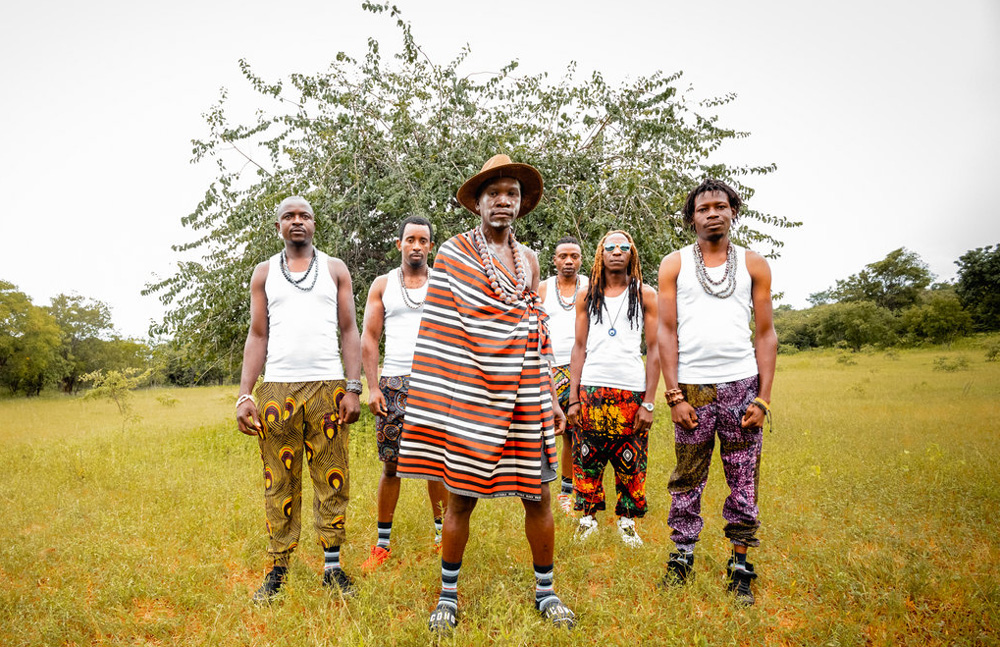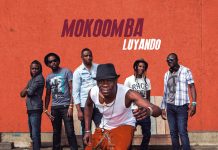Mokoomba are one of Southern Africa’s most prominent bands and a major musical export from Zimbabwe. Their music is inspired by the rhythms and harmonies of African regions, Afro-pop and funk, as evidenced by their album “Tusona: Tracings in the Sand”.

Mokoomba are Zimbabwe’s hottest musical export. One of the most important bands from southern Africa. The musicians around lead singer Mathias Muzaza thrill the audience with a fusion of traditional Zimbabwean rhythms and vocal harmonies from different regions of their country with Afro-pop or funk. A little over ten years ago, they landed on international stages like a UFO with the songs from their second album “Rising Tide”. And since then they have performed in over 40 countries and at almost all the big festivals – from Roskilde to SXSW, North Sea Jazz and Sziget to WOMAD. Their success is not only due to their compelling pan-African sound, but also to their high-energy live shows.
From the seventh wonder of the world
The musicians of Mokoomba are from Victoria Falls. A border town with Zambia in western Zimbabwe, situated on the Zambezi River. The region not only has one of the Seven Wonders of the World, Victoria Falls. It also borders Zambia, Botswana, Mozambique and Angola. It is therefore a crossroads of different cultures and ethnicities. These diverse influences can be clearly heard in Mokoomba’s music.
The six formed their band when they were still students at Mosi-Oa-Tunya High School in Victoria Falls. The biggest problem for the then 13- to 14-year-old teenagers was to get instruments like keyboards and guitars. They come from different milieus in their region, mainly from the Tonga and Luvale ethnic groups. They want to keep the music, cultures and languages of their home region alive. And not only to bring them onto the stages of the world, but also into the future. In 2010, a 50-minute documentary film about Mokoomba was released that is well worth seeing.
Traces in the sand and dancing masks
“Tusona : Tracings in the Sand” is the fourth album by Mokoomba. A pandemic album that they realised in a DIY process and without a producer. The album title is a tribute to the customs of their ancestors. Specifically to a system of signs and symbols drawn in the sand by the ancients that were clues for the young during initiation ceremonies. The song lyrics address social issues. Some in the form of traditional stories that are still important today as a guide to life. Nazara Hapana” is about a man who wants to secure his beloved wife and children with a will so that his own family will not dispossess and exploit his wife in case of his death.
The song “Tamvela Mama” is about a mother who advises her children that they should not only live peacefully with their siblings, but also with the neighbours and all other people they meet in life.
The man with 1000 voices
At the centre of the Mokoomba sound: the insane performance of lead singer Mathias Muzaza, with a huge vocal range and an impressive vocal intensity. They call him “the man with 1000 voices”, sometimes rough, sometimes soft, guttural, lilting and as spiritual as he is rocking. His fellow musicians say he is a wandering, talking, but mostly singing musical library of the songs of southern Africa. Muzaza speaks and sings in 7 languages.
But the other band members on guitar, bass, keyboards, percussion and drums are also essential as vocalists. They sing the background choruses, are the counterpart of the call and response parts. They sing in various local languages; Tonga, Luvale, Shona, Nyanja.
Special guests on the album are the three horn players of the Ghanaian highlife band Santrofi on trumpet, trombone and saxophone. The musicians have been friends for a long time and finally had the opportunity to go into the studio together. The brass parts make the sound fatter, drive it even further.
Other guests: the Congolese singer Desolo B, with whom Muzaza even sings in Lingala for once. And the young singer Ulethu from Harare’s house music scene. She sings the most soulful song together with Mathias Muzaza, who laments the death of his parents during the pandemic with a voice that gets under the skin.
Spiritual Chants & Killer Grooves
The sound of Mokoomba: Afro-grooves strongly anchored in Zimbabwean traditions and in Zambian Zamrock of the seventies, which was influenced by Anglo-American rock and funk. But they also pick up other important African styles, such as the versatile guitar-based music from the Congo. In addition to new songs, the album contains three song remakes of their last, more acoustic album “Luyando”, which are now dancefloor compatible.
“Tusona: Tracings in the Sand” is spirituality and groove. Played and sung by outstanding musicians and singers. The band has perfected their sound and made it more danceable.
Anna-Bianca Krause and NMR (foto: press Mokoomba)
















